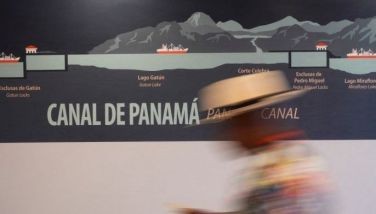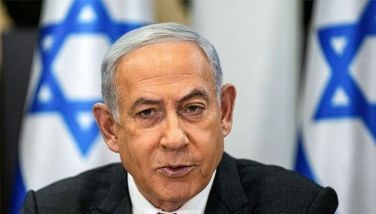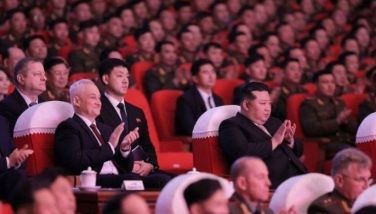Japan protests China paper's map of atomic clouds
TOKYO — Japan protested Wednesday to China over a newspaper's depiction of exploding mushroom clouds in a map of Japan, calling it offensive.
Chief Cabinet Secretary Yoshihide Suga told reporters that Japan, as the only nation to have suffered atomic attacks, will "never tolerate" such a depiction. It was "extremely imprudent" of the newspaper, he said. "And it rattled the nerves of atomic bomb survivors and their families."
The Chongqing Youth News carried a full-page color map of Japan, with the cartoon drawing of an exploding mushroom cloud over Hiroshima and Nagasaki and a title saying "Japan wants a war again." In the map, the green Japanese archipelago on the blue background was marked with the names of the two cities and Tokyo, in both English and Chinese.
It was unclear if the map was an advertisement or a graphic meant to accompany a commentary on the following page. The commentary, titled "Have we been too friendly to Japan in the past?" criticized Tokyo's decision to allow Japan's military to use force to defend its allies, an action previously banned as unconstitutional.
The newspaper was published on July 3, two days after Japan reinterpreted its war-renouncing constitution to allow a greater role for its military.
A man identifying himself only by his surname, Zhang, who answered the phone at the editors' office of the Chongqing Youth News, said the paper had no comment on the matter. The paper is run by the city of Chongqing's branch of the Communist Youth League, an organization that grooms university students for roles in the Communist Party.
Japan lodged protests to Beijing and the government of Chongqing, where the weekly paper is based. Tokyo also protested to the paper the day before. Foreign Minister Fumio Kishida, who is from Hiroshima, called the paper's allegation groundless and said Japan's defense policy change is not intended to wage war.
The two Asian rivals are major economic and trade partners, but have been disputed over uninhabited islands in the East China Sea and wartime history. Relations worsened in December after Prime Minister Shinzo Abe visited a Tokyo war shrine that honors Japan's convicted war criminals among the 2.5 million war dead.
At Wednesday's news conference, a Chinese Foreign Ministry spokesman Hong Lei refused to comment directly on the map, while repeating Beijing's position, saying recent Japanese actions have raised concerns among its Asian neighbors that suffered under Japan's wartime aggression. He criticized Japan for repeatedly creating provocations over historical issues.
"We hope Japan can learn lessons from history, go down the path of peaceful development, and avoid the repetition of historical tragedies," he said.
In the closing days of World War II, the U.S. dropped an atomic bomb on Hiroshima on Aug. 6, 1945, killing 140,000 people, and a second one on Nagasaki three days later, killing another 90,000, prompting Japan's surrender.
- Latest
- Trending






























